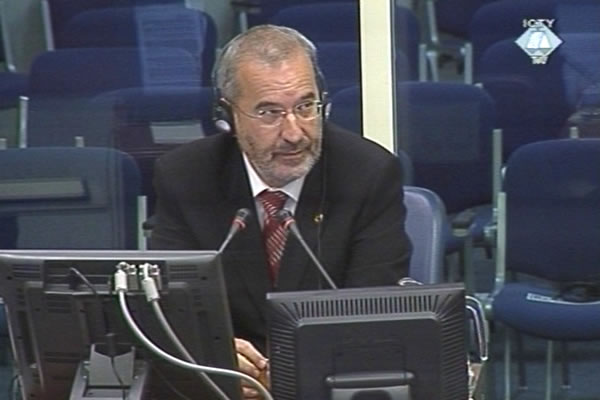Home
STATE PROSECUTOR GIVES EVIDENCE IN GOTOVINA'S DEFENSE
Current Croatian state prosecutor Mladen Bajic is testifying in the defense of Ante Gotovina. During Operation Storm, Bajic was a deputy military prosecutor in Split. He claims that the small number of indictments against Croatian soldiers for crimes against Serbs were not the result of any pressure exerted on the judiciary not to prosecute. In Bajic’s opinion, the real reasons were that the military police lacked experience, the military prosecutor’s office was understaffed and witnesses could not be contacted
 Mladen Bajić, svjedok odbrane Ante Gotovine
Mladen Bajić, svjedok odbrane Ante Gotovine The first witness of Ante Gotovina’s defense after the Tribunal’s summer recess is the current Croatian state prosecutor Mladen Bajic. During and after Operation Storm, it in the summer of 1995, Bajic was deputy military prosecutor in Split; Sector South in Krajina was under his jurisdiction. Generals Gotovina, Cermak and Markac are charged with crimes perpetrated against Krajina Serbs at that time. At the beginning of Bajic’s evidence, the statement he gave to Gotovina’s defense team in May 2009 was tendered into evidence.
Describing the role of the Split Military District commander - this is what Gotovina was during the war - the witness said Gotovina was under an obligation to relay to the military police all the information about the crimes committed by Croatian soldiers he had at his disposal. However, if the crimes had already been reported, the commander didn’t have to ‘file a second criminal report’. His only duty was to provide the information requested by the military police, Bajic noted. As Bajic explained, the military judiciary prosecuted HV personnel who committed crimes, while cases in which the crimes were committed by demobilized Croatian soldiers were referred to the civilian police and state prosecutor’s office.
The Croatian state prosecutor confirmed the argument of Gotovina’s defense that Gotovina and other commanders in the Split Military District were not under any obligation to take disciplinary measures against soldiers who were criminally prosecuted. If a disciplinary infraction is minor and has already been criminally prosecuted, there is no need for additional proceedings, Bajic explained. Similarly, in civilian life, there are no misdemeanor proceedings for an offence that has already been criminally prosecuted.
According to the logbooks of the Split military prosecutor’s office, tendered into evidence by the defense, 66 criminal reports were filed against Croatian soldiers after Operation Storm. Three of them are for murder and 63 reports for lootings. Many more criminal reports were filed against the Serbian army troops in Krajina for ‘armed rebellion’ against the Croatian state. The witness explained prosecuting crimes against Croatia had been a priority until the Amnesty Law was passed.
To explain why only a small number of crimes perpetrated by Croatian soldiers against Serbs were prosecuted, Bajic said that the military police lacked experience and the military prosecutor’s office was understaffed. Moreover, the witnesses of crimes, particularly in murder cases, were not available to the Croatian justice, because they had fled to Serbia and other neighboring countries. The situation has changed in recent years, Bajic claimed, when the cooperation between regional judiciaries has been stepped up. This has made it possible to prosecute more war crimes against Krajina Serbs. There was no pressure on either him or his colleagues in the military prosecution not to prosecute Croatian soldiers for the crimes they committed, Bajic declared.
As the hearing drew to a close, the prosecution started its cross-examination of Mladen Bajic, indicating it should finish by the end of tomorrow.
Linked Reports
- Case : Gotovina et al. - "Operation Storm"
- 2009-08-18 SOLANA’S NEW LETTER
- 2009-07-23 GOTOVINA’S MILITARY WITNESS ON ‘ASSUMED FACTS’
- 2009-07-17 WHEN LITTLE KIDS PLAY WAR…
- 2009-08-25 DEFENSE WITNESS: ‘LOOTING WAS ACCEPTABLE AND ALLOWED’
- 2009-08-31 DEFENCE EXPERT: ‘GOTOVINA DID EVERYTHING TO PREVENT CRIMES’
- 2009-09-07 EXPERT AGAINST EXPERT
